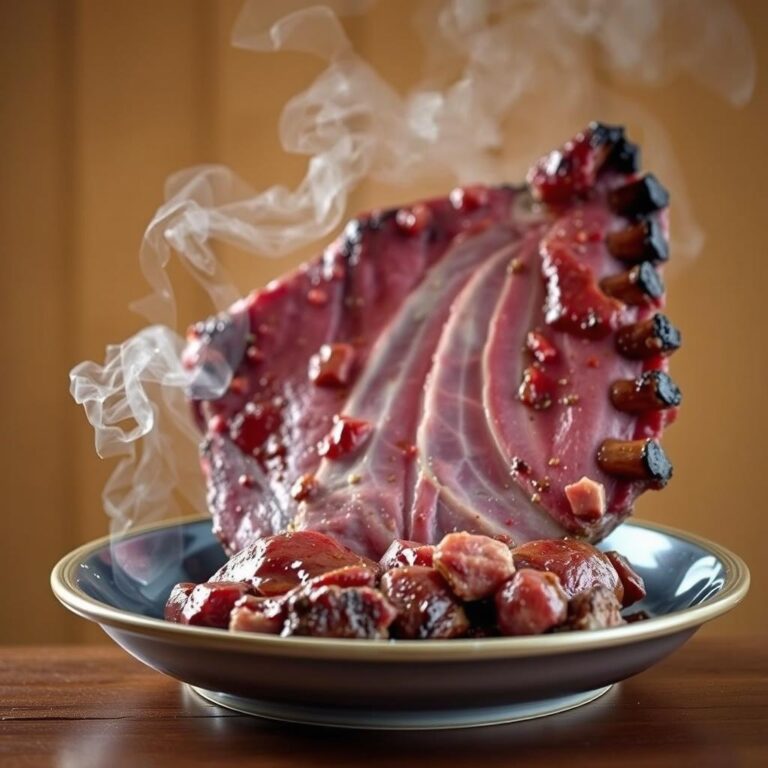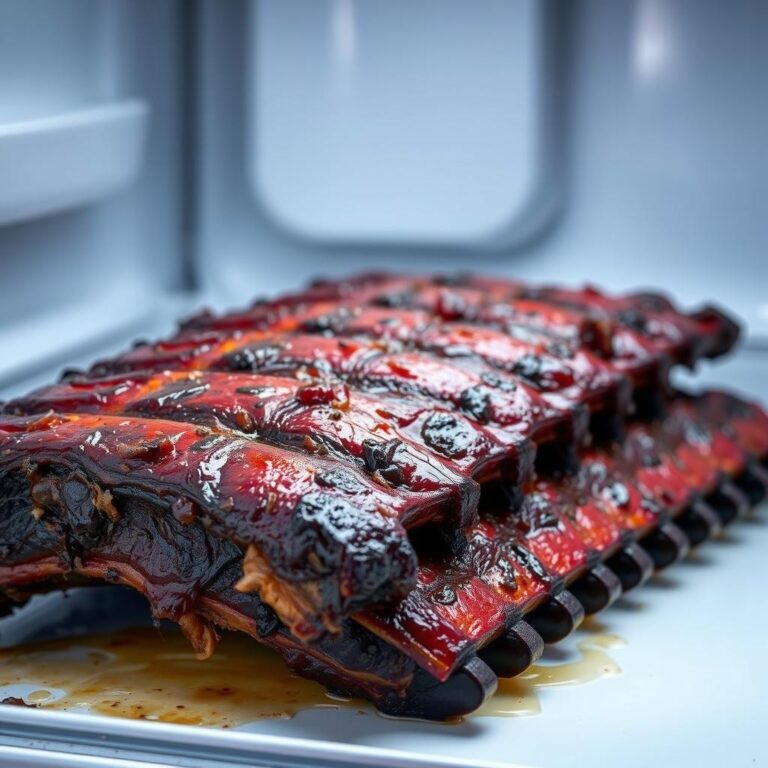How long is cooked venison good in the fridge? That's the question we're tackling today, because nobody wants to toss out perfectly good deer meat or risk a nasty case of food poisoning.
Understanding Venison Spoilage: The Clock is Ticking
Knowing the safe storage timeline for cooked venison is crucial for any hunter or venison enthusiast. It's all about keeping that delicious, hard-earned meat safe and enjoyable.
The main concern boils down to bacterial growth; the longer cooked venison sits in your fridge, the more opportunity those little critters have to multiply, potentially leading to foodborne illness. We're not just talking about a slightly off taste – we're talking about real risks to your health.
The Golden Rule: 3-4 Days Max
Generally, cooked venison lasts for 3-4 days in the refrigerator, no longer than that. This timeframe applies if you’ve stored it properly. We'll dive into proper storage techniques in just a bit. Think of it like this: you've invested time and effort into harvesting and preparing this lean game meat, so treat it right!
Factors Affecting Venison Shelf Life
Several factors play a role in determining how long your cooked venison will stay fresh:
- Initial Freshness: Was the venison fresh when you cooked it? The fresher it was to begin with, the longer it will last after cooking.
- Cooking Method: Did you grill, roast, or stew the venison? Some cooking methods might introduce more moisture, which can speed up spoilage.
- Storage Method: Is it sealed tightly? Improperly stored venison is exposed to air and other contaminants, accelerating the process of decay.
- Refrigerator Temperature: Is your fridge cold enough? Your refrigerator temperature should be consistently at or below 40°F (4°C) to inhibit bacterial growth.
Best Practices for Storing Cooked Venison
Follow these best practices to maximize the shelf life of your cooked venison:
- Cool it Down Quickly: Don't let cooked venison sit out at room temperature for more than two hours. Bacteria love warm environments.
- Divide and Conquer: Store leftovers in smaller, shallower containers. This allows for faster cooling in the fridge.
- Airtight is Key: Use airtight containers or heavy-duty freezer bags to prevent air exposure. Vacuum sealing is even better.
- Label and Date: Always label the container with the date you cooked the venison. This is a simple step that can save you from playing the "Is this still good?" guessing game.
Spotting the Signs of Spoiled Venison
Even if it hasn't been 3-4 days, you should always check for signs of spoilage before consuming leftover venison. It's better to be safe than sorry!
- Offensive Odor: Does it smell funky or sour? Trust your nose; a bad smell is a major red flag.
- Slimy Texture: Is the venison slimy to the touch? This is a clear indication of bacterial growth.
- Discoloration: Has the color changed drastically? Any unusual discoloration could mean it's past its prime.
- Mold Growth: Obvious mold is a definite no-go.
Freezing Venison: The Long-Term Solution
If you know you won't be able to eat the cooked venison within 3-4 days, freezing is your best bet for long-term storage. Frozen cooked venison can last for 2-3 months without significant loss of quality.
Reheating Cooked Venison Safely
When it's time to enjoy your stored venison, make sure you reheat it properly. The goal is to reach a safe internal temperature to kill any lingering bacteria.
- Use a Thermometer: Ensure the internal temperature reaches 165°F (74°C) before serving.
- Reheat Evenly: Whether you're using the microwave, oven, or stovetop, ensure the venison is heated evenly throughout.
- Don't Reheat Multiple Times: Reheating leftovers multiple times can increase the risk of bacterial growth. Only reheat the amount you plan to consume.
Common Mistakes That Shorten Venison's Fridge Life
Let's face it, we all make mistakes. But when it comes to food safety, these are some common errors to avoid:
- Leaving Venison Out Too Long: As mentioned before, the two-hour rule is crucial.
- Storing in a Warm Fridge: Double-check your refrigerator temperature. A warm fridge is a breeding ground for bacteria.
- Overcrowding the Fridge: A packed fridge restricts airflow, making it harder for food to cool down quickly.
- Ignoring Leftovers: Forgetting about leftovers lurking in the back of the fridge is a classic mistake.
Repurposing Leftover Cooked Venison
Don't let your leftover cooked venison go to waste! There are tons of creative ways to repurpose it:
- Venison Stew: Add it to a hearty stew with vegetables and broth.
- Venison Chili: Create a flavorful chili with beans, tomatoes, and spices.
- Venison Sandwiches: Slice it thinly and make delicious sandwiches with your favorite toppings.
- Venison Tacos or Wraps: Shred the venison and use it as a filling for tacos or wraps.
- Venison Shepherd's Pie: Top cooked venison with mashed potatoes and bake for a comforting meal.
How Long is Cooked Venison Good in the Fridge? A Recap
To wrap it up, remember that cooked venison is typically good for 3-4 days in the fridge when stored correctly. Prioritize proper storage, watch for signs of spoilage, and don't hesitate to freeze it if you can't eat it in time.

How long is cooked venison good in the fridge? That's the question we're tackling today, because nobody wants to toss out perfectly good deer meat or risk a nasty case of food poisoning.
Understanding Venison Spoilage: The Clock is Ticking
Knowing the safe storage timeline for cooked venison is crucial for any hunter or venison enthusiast.
It's all about keeping that delicious, hard-earned meat safe and enjoyable.
The main concern boils down to bacterial growth; the longer cooked venison sits in your fridge, the more opportunity those little critters have to multiply, potentially leading to foodborne illness.
We're not just talking about a slightly off taste – we're talking about real risks to your health.
The Golden Rule: 3-4 Days Max
Generally, cooked venison lasts for 3-4 days in the refrigerator, no longer than that.
This timeframe applies if you’ve stored it properly.
We'll dive into proper storage techniques in just a bit.
Think of it like this: you've invested time and effort into harvesting and preparing this lean game meat, so treat it right!
Factors Affecting Venison Shelf Life
Several factors play a role in determining how long your cooked venison will stay fresh:
- Initial Freshness: Was the venison fresh when you cooked it? The fresher it was to begin with, the longer it will last after cooking.
- Cooking Method: Did you grill, roast, or stew the venison? Some cooking methods might introduce more moisture, which can speed up spoilage.
- Storage Method: Is it sealed tightly? Improperly stored venison is exposed to air and other contaminants, accelerating the process of decay.
- Refrigerator Temperature: Is your fridge cold enough? Your refrigerator temperature should be consistently at or below 40°F (4°C) to inhibit bacterial growth.
Best Practices for Storing Cooked Venison
Follow these best practices to maximize the shelf life of your cooked venison:
- Cool it Down Quickly: Don't let cooked venison sit out at room temperature for more than two hours. Bacteria love warm environments.
- Divide and Conquer: Store leftovers in smaller, shallower containers. This allows for faster cooling in the fridge.
- Airtight is Key: Use airtight containers or heavy-duty freezer bags to prevent air exposure. Vacuum sealing is even better.
- Label and Date: Always label the container with the date you cooked the venison. This is a simple step that can save you from playing the "Is this still good?" guessing game.
Spotting the Signs of Spoiled Venison
Even if it hasn't been 3-4 days, you should always check for signs of spoilage before consuming leftover venison.
It's better to be safe than sorry!
- Offensive Odor: Does it smell funky or sour? Trust your nose; a bad smell is a major red flag.
- Slimy Texture: Is the venison slimy to the touch? This is a clear indication of bacterial growth.
- Discoloration: Has the color changed drastically? Any unusual discoloration could mean it's past its prime.
- Mold Growth: Obvious mold is a definite no-go.
Freezing Venison: The Long-Term Solution
If you know you won't be able to eat the cooked venison within 3-4 days, freezing is your best bet for long-term storage.
Frozen cooked venison can last for 2-3 months without significant loss of quality.
Reheating Cooked Venison Safely
When it's time to enjoy your stored venison, make sure you reheat it properly.
The goal is to reach a safe internal temperature to kill any lingering bacteria.
- Use a Thermometer: Ensure the internal temperature reaches 165°F (74°C) before serving.
- Reheat Evenly: Whether you're using the microwave, oven, or stovetop, ensure the venison is heated evenly throughout.
- Don't Reheat Multiple Times: Reheating leftovers multiple times can increase the risk of bacterial growth. Only reheat the amount you plan to consume.
Common Mistakes That Shorten Venison's Fridge Life
Let's face it, we all make mistakes.
But when it comes to food safety, these are some common errors to avoid:
- Leaving Venison Out Too Long: As mentioned before, the two-hour rule is crucial.
- Storing in a Warm Fridge: Double-check your refrigerator temperature. A warm fridge is a breeding ground for bacteria.
- Overcrowding the Fridge: A packed fridge restricts airflow, making it harder for food to cool down quickly.
- Ignoring Leftovers: Forgetting about leftovers lurking in the back of the fridge is a classic mistake.
Repurposing Leftover Cooked Venison
Don't let your leftover cooked venison go to waste! There are tons of creative ways to repurpose it:
- Venison Stew: Add it to a hearty stew with vegetables and broth.
- Venison Chili: Create a flavorful chili with beans, tomatoes, and spices.
- Venison Sandwiches: Slice it thinly and make delicious sandwiches with your favorite toppings.
- Venison Tacos or Wraps: Shred the venison and use it as a filling for tacos or wraps.
- Venison Shepherd's Pie: Top cooked venison with mashed potatoes and bake for a comforting meal.
How Long is Cooked Venison Good in the Fridge? A Recap
To wrap it up, remember that cooked venison is typically good for 3-4 days in the fridge when stored correctly.
Prioritize proper storage, watch for signs of spoilage, and don't hesitate to freeze it if you can't eat it in time.
Deep Dive: Venison and Food Safety
I know what you are thinking!
Let’s dig a little deeper, what makes venison different, and how does that affect food safety?
Venison, being a wild game meat, has some unique considerations compared to beef or chicken you pick up at the grocery store.
Understanding Venison's Unique Properties
First, the leanness of venison means it can dry out more quickly if not stored properly.
That’s why airtight storage is absolutely key.
Second, the way the animal was harvested and processed plays a big role in how long cooked venison is good in the fridge.
Field dressing the deer quickly and properly and keeping the meat cool during transport minimizes bacterial contamination from the get-go.
Always be mindful of where your venison comes from and how it was handled.
Fridge Temperature: Your First Line of Defense
I can’t stress this enough: make sure your refrigerator is dialed in to 40°F (4°C) or below.
This is non-negotiable.
Invest in a refrigerator thermometer and actually check it.
Don’t just assume it’s cold enough.
A few degrees warmer can drastically shorten the shelf life of cooked venison in fridge.
Regularly cleaning your fridge helps, too, by removing any lingering bacteria that could cross-contaminate your leftovers.
Cooking Methods and Shelf Life
Okay, so you’ve got your venison, and you’re ready to cook.
Consider how your cooking method will affect its storage potential.
Moist cooking methods, like braising or stewing, can introduce more moisture into the meat.
This can be a breeding ground for bacteria, potentially shortening the amount of time cooked venison is good in the fridge.
If you're planning to store leftovers, consider drier cooking methods like roasting or grilling.
Packaging Like a Pro: Extending Venison's Life
Let’s talk storage containers.
Ditch the flimsy plastic wrap and invest in some quality airtight containers or heavy-duty freezer bags.
Better yet, consider a vacuum sealer.
These suckers remove all the air, preventing freezer burn and significantly extending the freezer life.
For the fridge, I like using glass containers with tight-fitting lids.
They’re easy to clean, don’t leach chemicals, and let you see what’s inside.
Win-win-win.
Freezing Cooked Venison: Pro Tips
If you’re swimming in leftover cooked venison, freezing is your friend.
But don’t just toss it in a bag and call it good.
Here are some pro tips:
- Cool it completely: Before freezing, let the cooked venison cool down completely in the fridge. This prevents condensation, which can lead to freezer burn.
- Portion Control: Freeze in individual portions. This makes it easier to thaw only what you need and prevents you from reheating the entire batch multiple times.
- Double Wrap: For extra protection against freezer burn, wrap the venison in plastic wrap before placing it in a freezer bag.
- Squeeze out the air: Get as much air out of the freezer bag as possible before sealing.
Thawing Cooked Venison Safely
Alright, you’re ready to thaw that frozen venison.
Don’t leave it on the counter all day.
That’s a recipe for disaster.
Here are the safe thawing methods:
- In the Fridge: This is the safest method, but it takes time. Plan ahead, as it can take several hours or even overnight to thaw.
- In Cold Water: Place the venison in a leak-proof bag and submerge it in cold water, changing the water every 30 minutes.
- Microwave: If you’re in a hurry, you can use the microwave, but be sure to cook it immediately after thawing.
The Smell Test: Your Ultimate Guide
Look, I know we’ve talked about timelines and storage methods, but sometimes, you just have to trust your senses.
If that cooked venison has been in the fridge for a few days and you’re not sure, give it a good sniff.
Does it smell off? Does it have a weird, sour odor?
If so, toss it.
It’s not worth the risk of food poisoning.
Also, check for any slimy texture or discoloration.
If you see anything suspicious, err on the side of caution.
Preventing Foodborne Illness
I’m not trying to scare you, but foodborne illness is no joke.
It can cause some seriously unpleasant symptoms, like nausea, vomiting, diarrhea, and abdominal cramps.
In severe cases, it can even lead to hospitalization.
So, take food safety seriously.
Follow these tips to minimize your risk:
- Wash your hands: Before handling any food, wash your hands thoroughly with soap and water.
- Use separate cutting boards: Use separate cutting boards for raw meat and vegetables to prevent cross-contamination.
- Cook thoroughly: Make sure your venison is cooked to a safe internal temperature of 165°F (74°C).
- Clean your kitchen: Regularly clean your kitchen countertops, sinks, and appliances to remove any lingering bacteria.
Creative Leftover Venison Ideas
Now, let's assume you've stored your cooked venison perfectly and you're ready to enjoy it.
But you're tired of just reheating it.
I get it.
Here are some creative ideas to spice things up:
- Venison Ragu: Simmer shredded venison in a rich tomato sauce and serve over pasta.
- Venison Hash: Dice cooked venison and sauté it with potatoes, onions, and peppers for a hearty breakfast.
- Venison Quesadillas: Fill tortillas with shredded venison, cheese, and your favorite toppings.
- Venison Fried Rice: Add diced venison to your favorite fried rice recipe.
- Venison Pizza: Top a homemade or store-bought pizza with sliced venison, mushrooms, and onions.
Mastering Venison Storage: A Final Thought
Look, storing cooked venison safely isn't rocket science, but it does require attention to detail.
Pay attention to freshness, storage methods, and your fridge temperature.
Trust your senses, and when in doubt, throw it out.
By following these guidelines, you can enjoy your venison with confidence.
The duration of how long cooked venison is good in the fridge hinges on these best practices.
FAQ: Cooked Venison Fridge Storage
Got more questions? Here are some quick answers:
- Can I eat cooked venison after 5 days in the fridge? I wouldn't risk it. Stick to the 3-4 day rule for optimal safety.
- How can I tell if my cooked venison is spoiled? Look for an off odor, slimy texture, or discoloration. When in doubt, toss it out.
- Is it safe to reheat cooked venison multiple times? Reheating multiple times increases the risk of bacterial growth. Only reheat the amount you plan to consume.
- How long can I freeze cooked venison? Cooked venison can be frozen for 2-3 months without significant loss of quality.
- Does the type of venison (steak, roast, ground) affect storage time? The cut of venison doesn't significantly affect storage time as long as it's cooked thoroughly and stored properly.
Remember, food safety is crucial for you and your family.
Enjoy your wild game while minimizing health risks with these tips.
In conclusion, knowing how long is cooked venison good in the fridge is essential for enjoying this delicious and sustainable meat safely.


